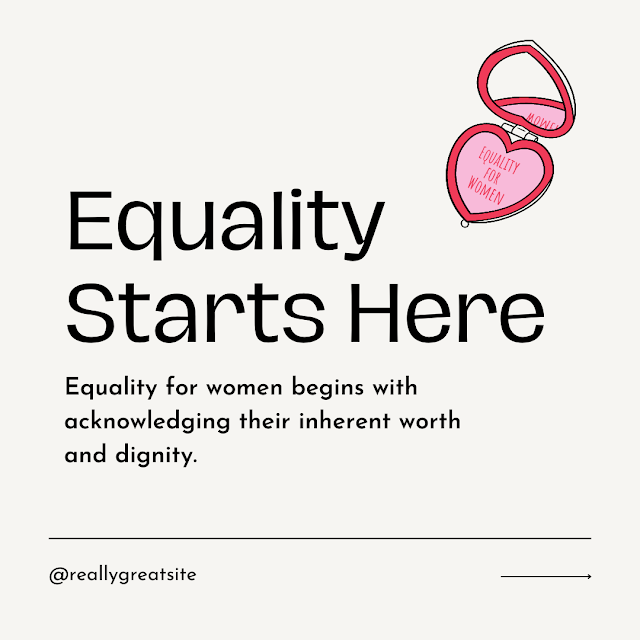Breaking Barriers: Challenging Misconceptions and Cultivating Understanding of Feminism Across Genders
It's disheartening to witness the widespread misunderstanding surrounding feminism, even among women themselves. Despite its profound impact on society and its continuous advocacy for gender equality, feminism is often misconstrued and misrepresented, leading to harmful stereotypes and misconceptions.
One of the most pervasive misconceptions is the belief that feminism equates to hating men. This harmful stereotype not only undermines the core principles of feminism but also alienates potential allies in the fight for gender equality. Feminism is not about vilifying men; rather, it's about challenging patriarchal structures and advocating for the rights and empowerment of all genders.
As a woman who embraces feminism, it deeply bothers me to see this misconception perpetuated, especially when it comes from those who could benefit most from understanding and supporting feminist ideals. Feminism is not about placing blame or fostering animosity; it's about recognizing and addressing systemic inequalities that affect individuals of all genders.
Furthermore, the lack of understanding of feminism extends beyond misconceptions about its core principles. Many people, including women, are unaware of the diverse perspectives and movements within feminism. From intersectional feminism to ecofeminism, there exists a rich tapestry of ideologies and approaches that contribute to the broader goal of gender equality.
The failure to grasp the true meaning and significance of feminism hinders progress toward a more equitable society. It perpetuates stereotypes, fosters division, and undermines the collective efforts of those fighting for gender justice. It's essential to challenge these misconceptions and engage in meaningful dialogue to foster a more nuanced understanding of feminism.
Education and advocacy are key to addressing these misconceptions and promoting a more inclusive and intersectional feminism. By amplifying diverse voices, challenging stereotypes, and fostering empathy and understanding, we can work towards a future where feminism is not only understood but embraced as a force for positive change.
Feminism emerged out of a dire necessity to address the systemic oppression and inequality that women have faced throughout history. For centuries, women have been relegated to subordinate roles and denied basic rights and opportunities simply because of their gender. The need for feminism stems from the pervasive and entrenched barriers that have restricted women's autonomy, agency, and equality in virtually every aspect of life.
One of the primary reasons feminism was needed was to challenge the legal and societal restrictions that limited women's rights and opportunities. Historically, women were denied the right to vote, own property, pursue education and careers, and make decisions about their own bodies. These restrictions were often enshrined in laws and reinforced by cultural norms that upheld patriarchal power structures.
Women's bodies and sexuality were particularly policed and controlled, with limited access to reproductive healthcare and autonomy over reproductive choices. In many societies, women were expected to adhere to strict gender roles, conforming to expectations of modesty, obedience, and domesticity.
Moreover, women faced discrimination and exclusion in the workforce, with limited opportunities for advancement and unequal pay compared to their male counterparts. Occupational segregation and glass ceilings prevented women from fully participating in economic life and realizing their full potential.
In addition to legal and economic barriers, women also grappled with social and cultural norms that perpetuated gender inequality. From harmful stereotypes and beauty standards to systemic misogyny and violence against women, the pervasive nature of sexism reinforced the need for a movement dedicated to challenging and dismantling these oppressive systems.
Feminism was needed to demand recognition of women's inherent dignity and worth, to advocate for equal rights and opportunities, and to challenge the structures of power and privilege that perpetuated gender inequality. By raising awareness, mobilizing collective action, and advocating for policy change, feminism has played a pivotal role in advancing the rights and status of women worldwide.
While progress has been made, the fight for gender equality is far from over. Feminism remains as relevant today as ever, as we continue to confront persistent inequalities and work towards a more just and equitable society for all genders.
Feminism is a multifaceted movement centered around the belief in gender equality and the advocacy for women's rights. At its core, feminism seeks to challenge and dismantle the societal structures, norms, and expectations that perpetuate discrimination, oppression, and inequality based on gender.
The origins of feminism can be traced back centuries, with roots in the fight for women's suffrage, autonomy, and basic rights. While the movement has evolved over time, its inception is often associated with the first wave of feminism in the 19th and early 20th centuries.
The first wave of feminism emerged in the late 19th century, primarily in Western countries, as women began to mobilize for political and social change. One of the central goals of this wave was securing women's right to vote, which culminated in milestones such as the suffrage movements in the United States and the United Kingdom.
During this time, feminist pioneers such as Susan B. Anthony, Elizabeth Cady Stanton, and Emmeline Pankhurst emerged as leading figures in the fight for women's rights. Their activism paved the way for significant legal and social advancements, including the passage of the 19th Amendment in the U.S., granting women the right to vote in 1920.
The second wave of feminism emerged in the mid-20th century, focusing on issues such as reproductive rights, workplace equality, and challenging traditional gender roles. This wave saw the rise of prominent feminist voices like Betty Friedan, Gloria Steinem, and bell hooks, who sparked conversations about sexism, patriarchy, and the intersectionality of oppression.
Throughout the latter half of the 20th century and into the 21st century, feminism continued to evolve, giving rise to waves of activism addressing issues such as LGBTQ+ rights, racial justice, and global gender inequality. Intersectional feminism, championed by scholars and activists like Kimberlé Crenshaw, emphasized the interconnectedness of various forms of oppression, highlighting the importance of addressing multiple axes of identity.
Today, feminism encompasses a diverse array of perspectives, ideologies, and movements, including liberal feminism, radical feminism, ecofeminism, and more. While progress has been made in many areas, challenges persist, reminding us of the ongoing need for feminist activism and advocacy.
In essence, feminism is a dynamic and inclusive movement that seeks to challenge power dynamics, dismantle oppressive systems, and create a world where all individuals, regardless of gender, have the opportunity to live free from discrimination and inequality.
Men's perspectives on feminism are diverse and varied, influenced by factors such as personal experiences, cultural norms, and societal expectations. While some men wholeheartedly support feminist ideals and actively advocate for gender equality, others may hold misconceptions or feel threatened by the movement.
For those who embrace feminism, it's often seen as a necessary and just cause, recognizing the importance of challenging gender norms and dismantling systems of oppression. These men understand that feminism benefits everyone by promoting fairness, justice, and equal opportunities for all genders. They recognize the ways in which patriarchy harms not only women but also perpetuates harmful stereotypes and restricts men's emotional expression and personal fulfillment.
On the other hand, some men may feel uneasy or resistant towards feminism, viewing it as a challenge to their own power or privilege. They may perceive feminist movements as divisive or exclusionary, fearing that their experiences and perspectives will be marginalized or dismissed. These men may also hold onto outdated stereotypes about feminists being anti-men or seeking to dominate rather than achieve equality.
It's important to acknowledge that men's attitudes towards feminism are not monolithic and can evolve over time. Some men may initially be skeptical or hesitant about feminism but become allies as they learn more about its principles and goals. Education, dialogue, and exposure to diverse perspectives can play a crucial role in fostering understanding and empathy among men who may have reservations about feminism.
Ultimately, men's engagement with feminism is essential in the pursuit of gender equality. By challenging harmful stereotypes, confronting toxic masculinity, and advocating for gender-inclusive policies and practices, men can play a vital role in creating a more equitable and just society for all genders. It's about recognizing that feminism is not a zero-sum game but rather a collective endeavor towards a more inclusive and compassionate world.
Thankful for your presence, Neja

.png)
.png)
.png)
.png)









Comments
Post a Comment